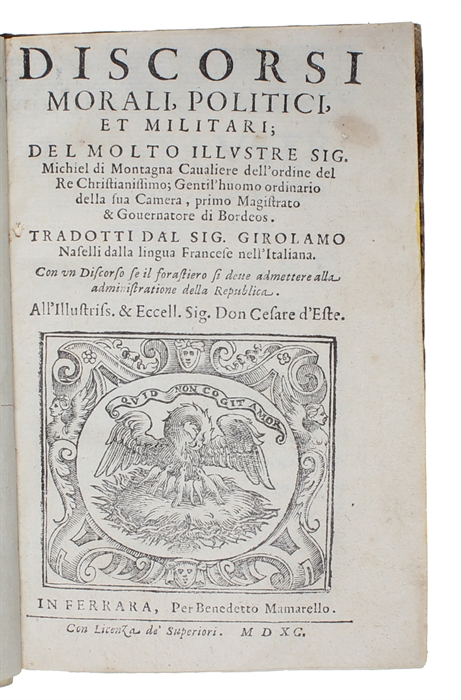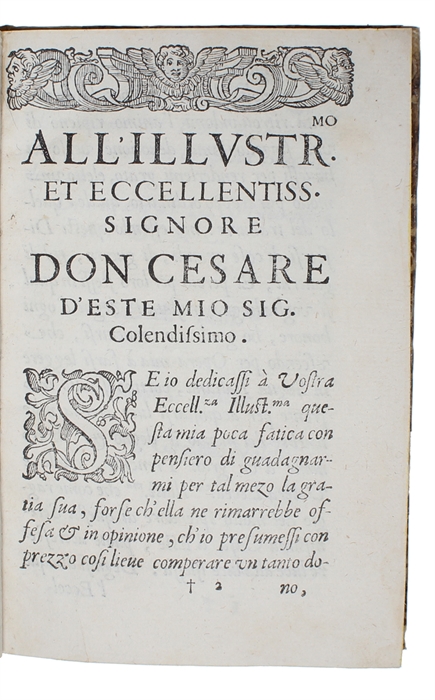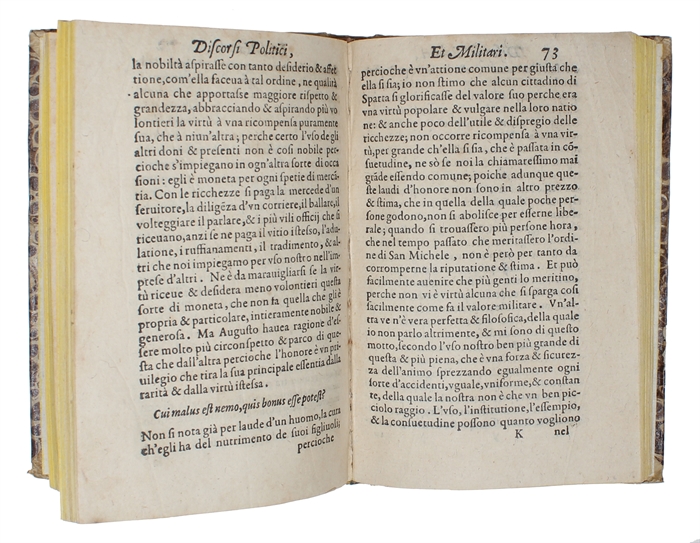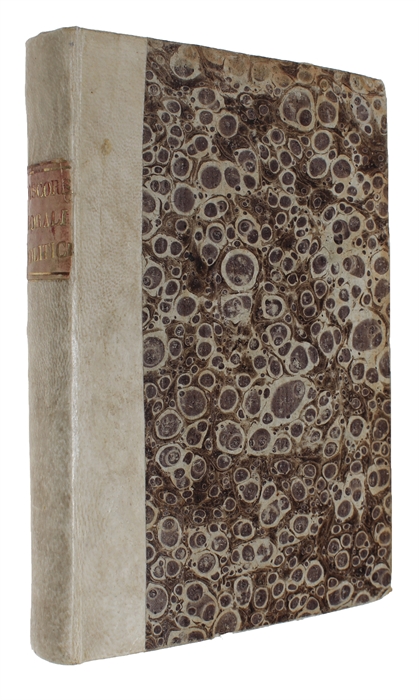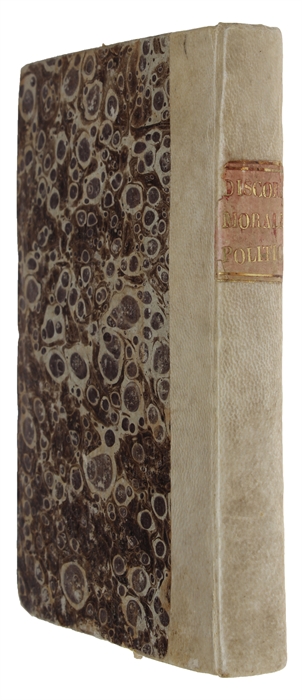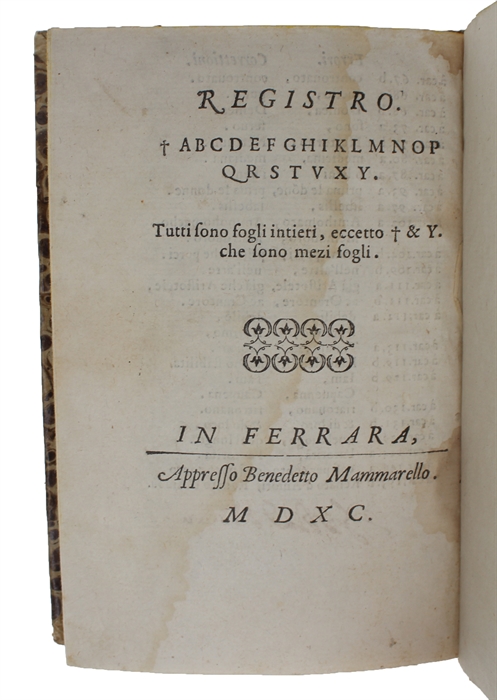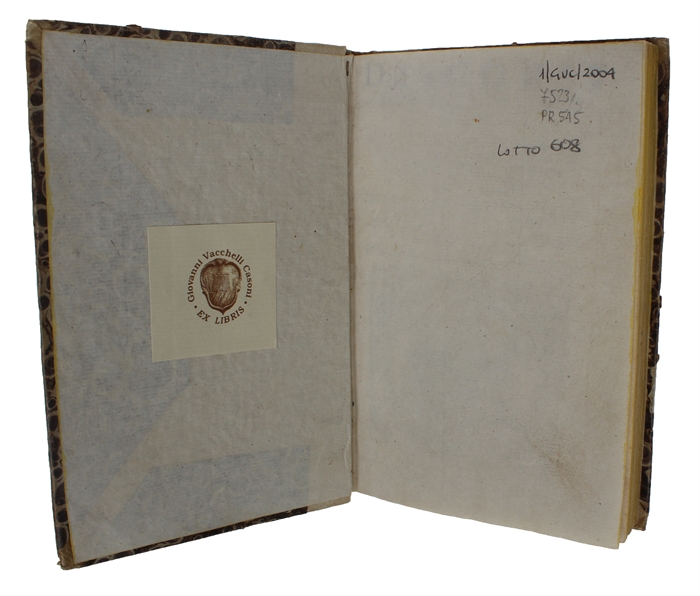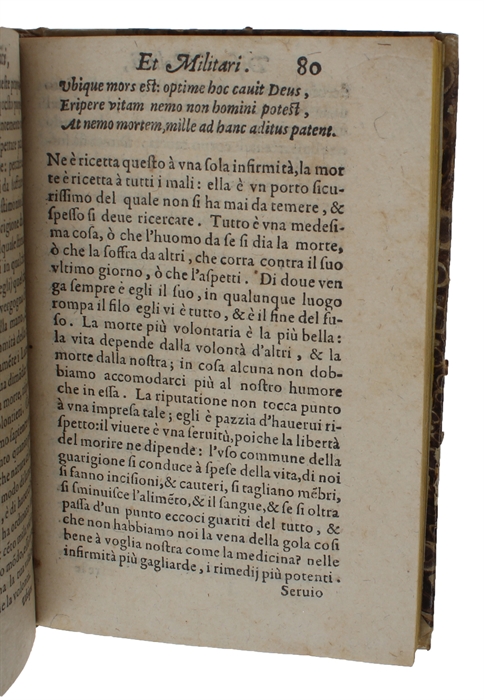THE FIRST TRANSLATION OF MONTAIGNE'S ESSAYS
MONTAIGNE, MICHEL de.
Discorsi, morali, politici, et militari. Tradotti dal sig. Girolamo Naselli lingua Francese nell' Italiana. Con un Discorso se is forastiero si deue admettere alla administratione della Republica. All'Illustriss. & Eccell. Sig. Don Cesare d'Este.
Ferrara, Benedetto Mamarello, 1590.
Small 8vo. Later half vellum with gilt title-label to spine. Marbbled paper over boards. A faint damp stain to the last few leaves, otherwise a nice and clean copy. Old ownership-signature to last leaf. Bookplate to inside of front board. Large woodcut device to title-page. Woodcut initials and headpieces at beginning. (8), 170, (5) pp.
The very scarce first edition of the first translation into any language of any part of Montaigne's Essays, namely Naselli's monumental first Italian translation, which came to pave the way for later translations of the work, among them Florio's first English from 1603.
Montaigne's magnum opus was published in 1580, and in 1588, the final edition appeared, constituting the definitive text of the work and that on which all later editions were based. With his seminal work, Montaigne not only created a novel genre of writing, he also founded modern scepticism and the revival of ancient scepticism, and he paved the way for the modern philosophy and thought presented by Bacon, Decartes and Newton.
"Unlike anti-intellectuals like Erasmus, Montaigne developed his doubts through reasoning. Unlike his skeptical predecessors who presented mainly a series of reports on the variety of human opinions, Montaigne worked out his complete Pyrrhonism through a sequence of levels of doubt, culminating in some crucial philosophical difficulties... The occurrence of Montaigne's revitalization of the Pyrrhonism of Sextus Empiricus, coming at a time when the intellectual world of the 16th century was collapsing, made the "nouveau Pyrrhonisme" of Montaigne not the blind alley that historians like Copleston and Weber have portrayed, but one of the crucial forces in the formation of modern thought... It was also to be the womb of modern thought, in that it led to the attempt either to refute the new Pyrrhonism, or to find a way of living with it." (Popkin, vol. II, 1960, pp. 54-55).
There are many important aspects of Montaigne's groundbreaking work, which has been subject of an uncountable number of scholars throughout centuries. But one aspect which seems to have been forgotten in recent times is one that is emphasized by Naselli's extremely important first ever translation of the work. As the Italian title will reveal, the work was also widely viewed - and intended - as a political council book.
Naselli bases his translation on Montaigne's own final edition from 1588 and publishes it merely two years later, including 42 of 94 chapters of the first two books. His translation is the one closest in time to the original appearance of the work and is the only one published in Montaigne's own life-time. It is thus in a unique position to tell us about contemporary views on the work and its use.
"One enormously important prose genre upon which Montaigne draws most heavily consists of political advice books for courtiers and princes that proliferated in great number and with great social and political impact in the late Renaissance. Montaigne's appropriation of the political counsel genre has gone largely unnoticed by contemporary scholars, and bringing it into focus has significant implications for our understanding of the "Essais"... bringing it to the foreground allows us to challenge more robustly the common conclusion that Montaigne's unique project "is not a political work."
Many in the first generation of Montaigne's reception appear to have seen the "Essais" principally as a contribution to the political contribution to the political counsel literature. For example, Girolamo Naselli's 1590 Italian translation of the "Essais is titled "Discorsi morali, politici e military", while John Florio follows Naselli's lead in the title of his 1603 English translation, "The Essayes or Morall, politike and militaire discourses". And when Francis Bacon enthusiastically adopts Montaigne's novel "Essai"-form for his own ends, he does so as a useful means of giving "Councels Civill and Morall", not simply musings personal and poetic." (Thompson, Montaigne and the Tolerance of Politics, p. 21).
As is mentioned on the title-page, this first translation also contains another, long "questione". "In this deliberative discourse, very different in kind from anything a modern reader would associate with "Essais", and apparently composed soon after the winter 1576-7 Estates General of Blois, the author argues methodically and resolutely against those at the assembly who in a public "ragionamento" demonstrated the employment of foreigners in a republic to be universally undesirable, and who nearly succeeded in having this position passed into law." (Boutcher: The Scool of Montaigne in Early Modern Europe, vol. 2, p. 136).
Order-nr.: 55265

